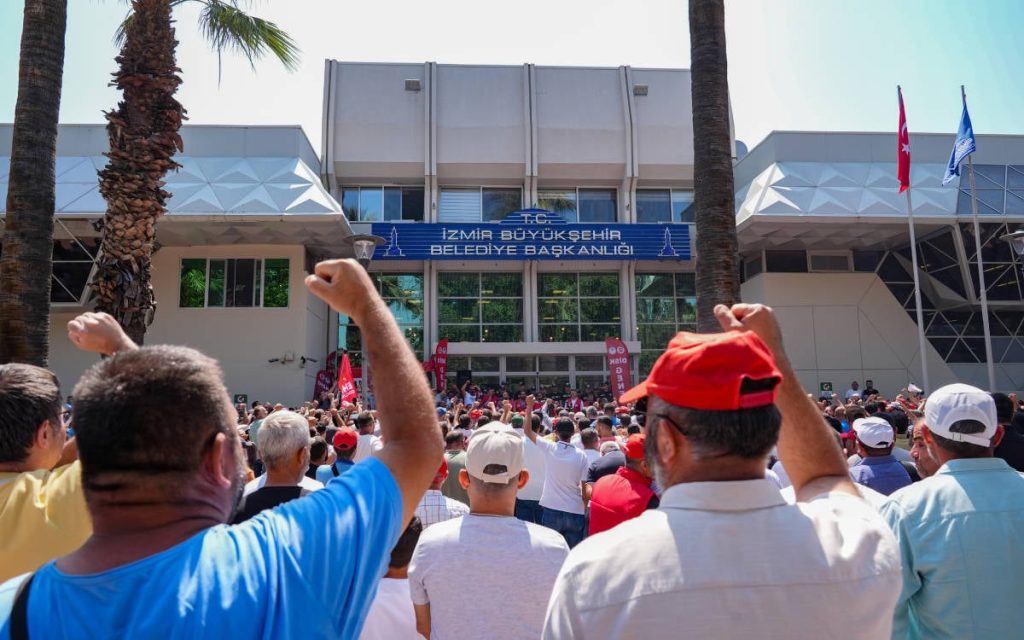A major development has transpired in İzmir as the strike involving 23,000 municipal workers concludes under a collective bargaining agreement just prior to the Eid al-Adha holiday. Despite assurances from İzmir Metropolitan Municipality (İzBB) Mayor Cemil Tugay against mass layoffs, the city has initiated the dismissal of around 1,000 employees from various departments. This decision has sparked controversy and legal challenges, raising concerns regarding the future of employee rights and the efficacy of recent labor agreements.
| Article Subheadings |
|---|
| 1) The End of the Strike and Its Immediate Aftermath |
| 2) Details of the Layoff Process Initiated |
| 3) Criteria for Employee Dismissals |
| 4) Legal Controversies Surrounding the Collective Agreement |
| 5) Implications for Workers and Union Relations |
The End of the Strike and Its Immediate Aftermath
On June 4, 2025, a significant collective bargaining agreement reached between the İzmir Metropolitan Municipality and unions affiliated with the Confederation of Progressive Trade Unions of Turkey (DİSK) marked the end of a prolonged strike involving 23,000 workers. The strike, which had drawn considerable attention, concluded just before the Eid al-Adha holiday, a time typically characterized by community spirit and celebration. With the agreement now in effect, many workers anticipated a smoother operational environment and improved labor relations. However, only days after the conclusion, uncertainty began to loom as the municipality announced significant layoffs, undermining the sense of security that had been established.
Details of the Layoff Process Initiated
Despite Mayor Cemil Tugay previously asserting that efforts to reduce worker numbers would not lead to mass layoffs, the İzmir Metropolitan Municipality commenced layoffs as of June 10, 2025. The decision has raised alarms among union leaders and workers alike, as it contradicts earlier commitments made by the Mayor. Reports indicate that 1,000 workers are to lose their jobs, with 800 from the İZDOĞA department and 100 each from İZULAŞ and İZBETON. The municipality has communicated that this layoff initiative, which will continue through July 4, is unavoidable and is described as a “mandatory mass layoff,” a term that has been met with disapproval from labor advocates.
Criteria for Employee Dismissals
An official notice details the criteria established for the layoffs, which has compounded worries among the workforce. According to the notice, employees liable to be laid off will include those who either voluntarily resign or are eligible for retirement. Additionally, those unwilling to be reassigned to different positions following the elimination of current roles or who are subject to the principle of last-in, first-out are also targeted for dismissal. The notice urges union representatives to liaise with the Human Resources Department for preparing the layoff list, providing a procedural framework that some feel lacks transparency and fairness in its implementation.
Legal Controversies Surrounding the Collective Agreement
In a separate yet equally contentious issue, Mayor Cemil Tugay has taken legal action against the collective bargaining agreement. His primary contention pertains to a clause that guarantees workers a pay increase equivalent to annual inflation plus an extra three percentage points in the agreement’s second year—totaling a substantial 42.05%. The challenge to amend this provision reflects deeper concerns about labor rights in the face of economic pressures. However, a court ruling has thus far denied the Mayor’s request to revise this safeguard, leaving the terms of the agreement intact for now.
Implications for Workers and Union Relations
The ongoing situation has sparked significant concerns regarding the future of labor relations in İzmir. The unexpected layoffs, combined with the legal challenges to the collective agreement, set a precarious stage for both the workers and the unions. There is a palpable sense of distrust among employees regarding the municipality’s commitment to protecting their rights. This saga not only raises questions about job security for the current workforce but also has broader implications for future negotiations between unions and the municipality. Workers and unions alike are poised to respond to the unfolding events, potentially leading to further actions if their rights are perceived to be at stake.
| No. | Key Points |
|---|---|
| 1 | The strike involving 23,000 municipal workers ended with a collective bargaining agreement on June 4. |
| 2 | The İzmir Metropolitan Municipality initiated the termination of 1,000 employees on June 10, raising concerns about mass layoffs. |
| 3 | Official criteria for layoffs include voluntary resignations, retirement eligibility, and non-reassignment willingness. |
| 4 | Mayor Tugay has challenged the collective bargaining agreement’s salary increase clause in court, but his request was denied. |
| 5 | The situation heightens tensions between the municipality and its workforce, potentially impacting future labor negotiations. |
Summary
The current developments in İzmir highlight a complex landscape of labor relations, reflecting both the fragility of recently achieved agreements and the ongoing struggles for workers’ rights amidst economic challenges. While the strike has concluded, the resulting layoffs and legal disputes suggest a turbulent road ahead for the municipality and its employees. Stakeholders will need to navigate these challenges carefully to foster a more stable and equitable work environment moving forward.
Frequently Asked Questions
Question: What led to the strike involving 23,000 workers?
The strike was initiated due to disputes over labor rights and conditions, culminating in a collective bargaining agreement that aimed to address worker grievances.
Question: What does the term “mandatory mass layoff” signify in this context?
The term refers to a formal process by which the municipality has deemed certain layoffs unavoidable, despite prior assurances against mass dismissals.
Question: How has the legal challenge by Mayor Tugay affected the collective agreement?
Although the Mayor’s challenge aimed to adjust compensation terms in the collective agreement, the court’s rejection of his request means the original terms remain enforceable.
